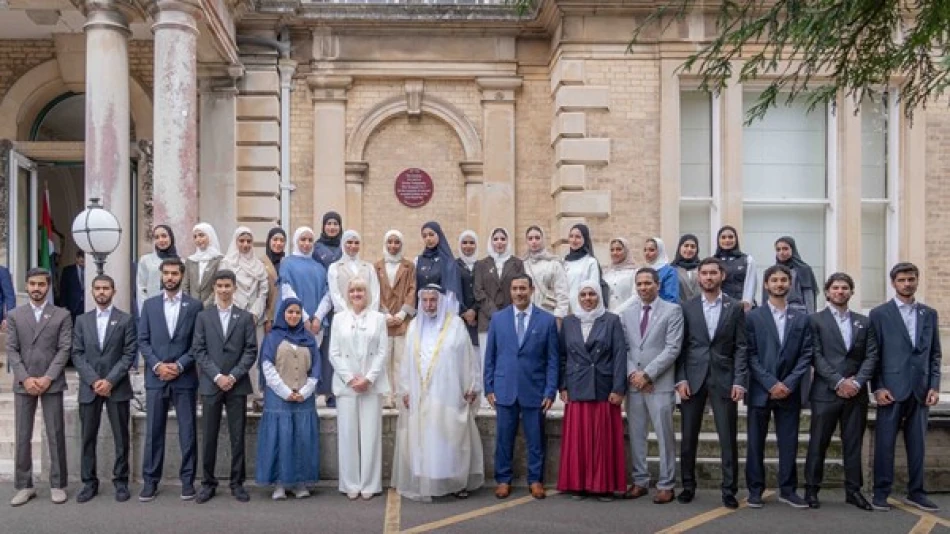
Sharjah Ruler Meets Khorfakkan University Students in Exeter's Educational Program
Sharjah's Marine Science Vision: Ruler Backs Students in Major UK Partnership Program
The UAE's Sharjah emirate is positioning itself as a regional hub for marine research through an ambitious academic partnership with the University of Exeter. Ruler Sheikh Dr. Sultan bin Mohammed Al Qasimi met with 26 marine science students who completed an intensive program in the UK, outlining his vision for transforming the emirate's coastal areas into centers of scientific discovery while investing 100 million dirhams in a new marine research facility.
Strategic Investment in Marine Research Infrastructure
Sheikh Sultan's announcement of a 100-million-dirham marine research center represents a significant commitment to positioning Sharjah alongside established marine research hubs. The facility will enable students to conduct deep-sea research, learn advanced diving techniques, and utilize cutting-edge equipment for ocean exploration.
This investment mirrors similar moves by other Gulf states to diversify their knowledge economies. The UAE's broader strategy includes Dubai's Marine and Maritime Academy and Abu Dhabi's focus on blue economy initiatives, but Sharjah's approach emphasizes fundamental research over commercial applications.
Unexplored Waters as Economic Opportunity
The ruler's emphasis on exploring "places where humans have never dived" in Khor Fakkan's coastal waters suggests untapped potential for marine biodiversity research and possibly bioprospecting opportunities. Khor Fakkan's strategic location on the Gulf of Oman, with its deeper waters and different marine ecosystems compared to the Arabian Gulf, offers unique research possibilities.
This focus on uncharted marine territories could yield discoveries relevant to biotechnology, pharmaceuticals, and sustainable aquaculture – sectors increasingly valuable in the global blue economy, projected to reach $3 trillion by 2030.
Academic Partnership Model with Global Implications
The Khor Fakkan University-Exeter partnership represents a hybrid model combining UAE funding with British academic expertise. The program included laboratory workshops, environmental data analysis, field research, and visits to UK marine sites, providing students with comparative perspectives on coastal ecosystems.
Competitive Positioning in Regional Education
This initiative places Sharjah in direct competition with established regional marine research centers like Saudi Arabia's King Abdullah University of Science and Technology (KAUST) and Qatar's marine science programs. However, Sharjah's smaller scale allows for more personalized attention and potentially faster implementation of research findings.
The ruler's personal involvement – unusual for higher education programs – signals the strategic importance placed on marine sciences within Sharjah's economic diversification plans.
Environmental Conservation Meets Economic Development
Sheikh Sultan's remarks linking environmental protection with economic development reflect growing recognition that marine conservation can drive sustainable tourism and research-based industries. His vision of students becoming "pioneers" in unexplored marine areas suggests plans for systematic mapping and study of local waters.
The integration of conservation with scientific research could attract international partnerships and funding, particularly as global attention focuses on ocean health and climate change impacts on marine ecosystems.
Long-term Implications for UAE's Knowledge Economy
The program's emphasis on practical skills alongside theoretical knowledge addresses a common criticism of Gulf higher education – the gap between academic study and applicable expertise. By combining UK academic rigor with local environmental focus, the initiative could produce graduates capable of supporting both regional marine industries and international research collaborations.
The ruler's advice to students about self-reliance and continuous learning beyond formal education suggests awareness that rapidly evolving marine technologies require adaptive, independent researchers rather than traditional academic graduates.
This investment in marine sciences, while modest compared to major oil revenues, represents the type of targeted, sustainable economic diversification that could define the UAE's post-oil future. Success could establish a replicable model for other Gulf states seeking to leverage their coastal resources for knowledge-based development.
Most Viewed News

 Layla Al Mansoori
Layla Al Mansoori






